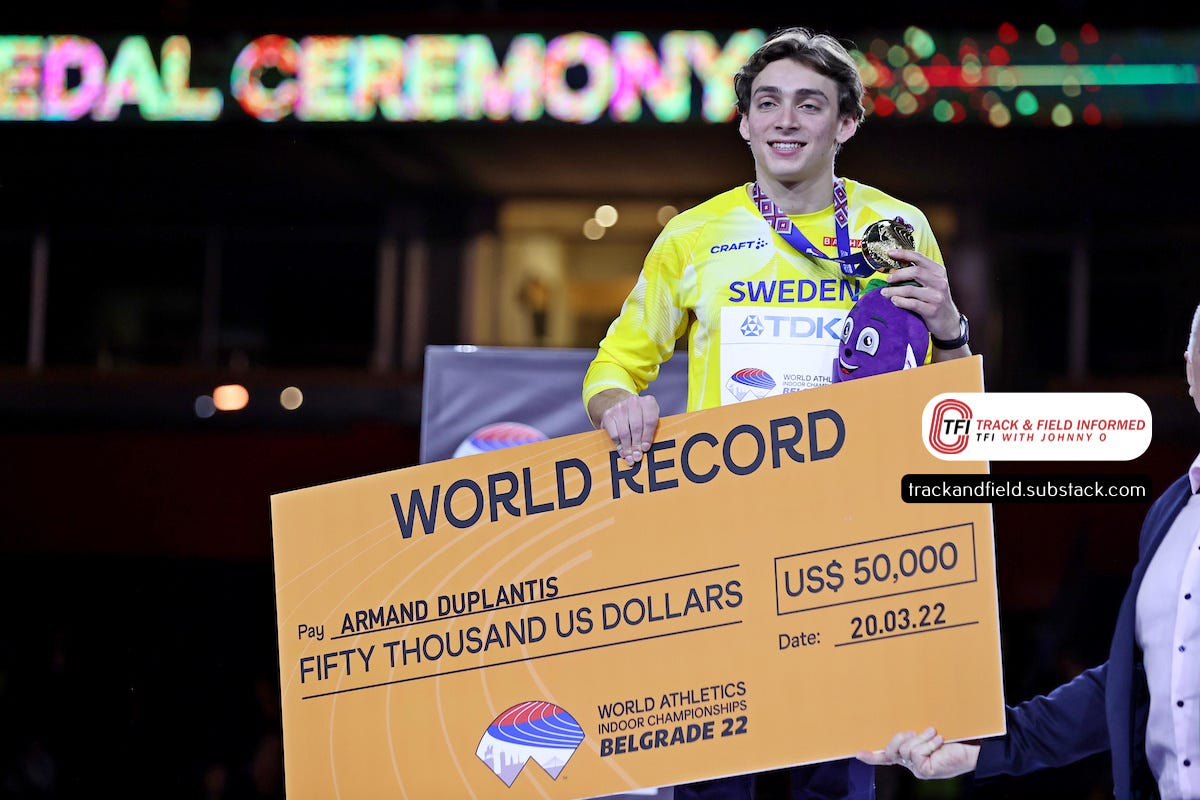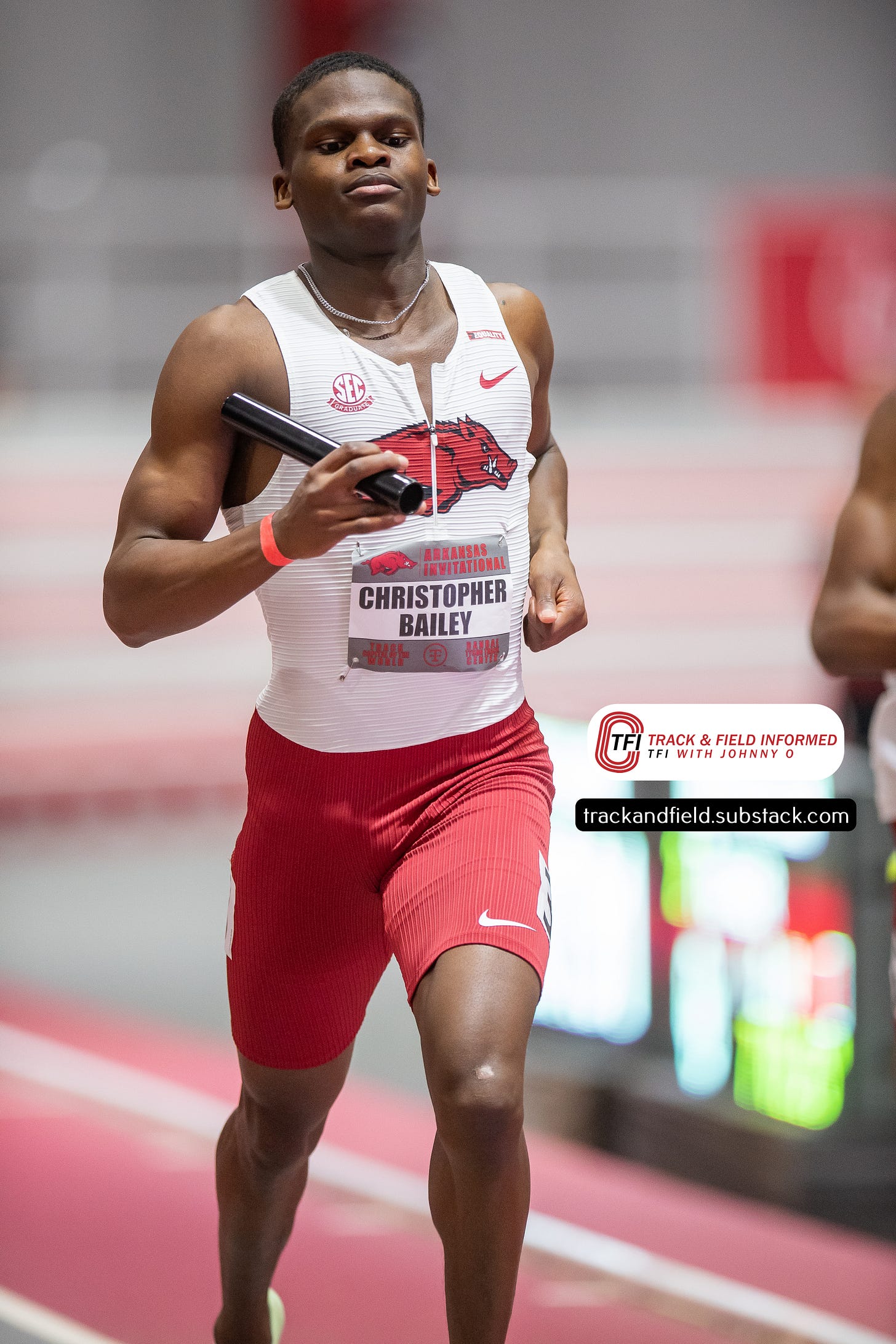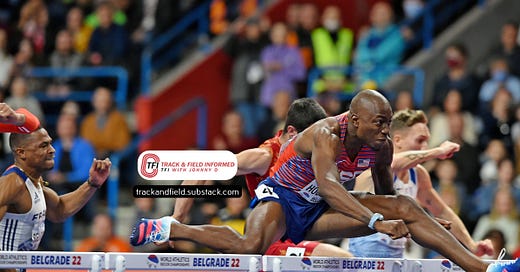
One of them is the greatest pole vaulter of all time in the eyes of most track and field historians.
The other would be in the discussion if the topic was the top high hurdlers in history.
And Mondo Duplantis of Sweden and Grant Holloway of the U.S. added to their legacies on Saturday when they won heir third consecutive titles in the men’s pole vault and 60-meter high hurdles, respectively, in the World Athletics Indoor Championships in Nanjing, China.
The 25-year-old Duplantis cleared 6.15 meters (20 feet 2 inches) in the pole vault and the 27-year-old Holloway ran 7.42 seconds in the hurdles on a day when Jakob Ingebrigtsen of Norway and Christopher Bailey of the U.S. also won gold medals on the men’s side of the meet with victories in the 3,000 and 400 meters.
For good measure, Bailey led a 1-2-3 U.S. sweep in the 400 on the second day of the three-day meet.
“It was great,” Holloway said in a World Athletics post after his third global indoor title matched the trio he has won outdoors in the 110-meter barrier race. “This one was a little bit different. I didn't have two great rounds, and had to rely on my experience to get me through the final. But I knew what I had to do; I knew what I was missing. Everybody was telling me, ‘you've done this a million times before, you just got to do it again’.
“To win three indoors, and three outdoors, I think I'm the first person in history to ever do that. That's an amazing stat. Also, I think I can put grace in it, and hang up the 60m hurdles and try out a new event next year. That's something I can think about.”
While Holloway’s winning time of 7.42 gave him a large margin of victory over second-place Wilhem Belocian of France, who ran 7.54, and third-place Junxi Liu of China, who clocked 7.55, he had run 7.29 when he won the 2022 global title in Belgrade, Serbia, as well as in last year’s meet in Glasgow, Scotland.
Although he had twice clocked a yearly world-leading time of 7.36 this season, he has run faster than that on 13 occasions during his career.
He started his day on Saturday when he ran 7.49 in a first-round heat. That put him nearly a tenth of a second ahead of Belocian, but Holloway was only three hundredths of a second in front of the Frenchman when he clocked 7.48 in the third of three semifinals. In addition, Junxi had also run 7.51 in the second semifinal.
Those statistics could have led some to contemplate the unthinkable, that Holloway could be beaten in a 60 hurdles race for the first time since his sophomore year in high school. But he got off to one of his typically rocket starts in the final and had taken control of the race as he came off the second of five barriers.
Duplantis, who had cleared 6.20 (20-4) and 6.05 (19-10¼) in winning his two previous world indoor titles, also got more competition than usual on Saturday as Emmanouil Karalis of Greece set a national record of 6.05 when he cleared that height on his first attempt.
Karalis had made all five of his attempts at that point in the competition, but he missed his first two tries at 6.10 (20-0) before he passed to 6.15 (20-2), where he missed his one — and only — allotted attempt at that bar.
Duplantis had cleared 5.70 (18-8¼), 5.90 (19-4¼), 6.00 (19-8¼), and 6.05 (19-10¼) on his first attempts. But he missed his first try at 6.10 (20-0) before making it on his second attempt after brushing the bar as he cleared it.

He had not looked great, by his standards, while vaulting at 6.10, but there was an impressive gap between him and the bar when he cleared 6.15 (20-2) on his first try.
However, he chose not to continue jumping after that, meaning that the world record of 6.27 (20-6¾) that he set in Clermont-Ferrand, France, at the end of last month, will stand for at least a little while longer.
Ingebrigtsen had set world records in the 1,500 meters — at 3:29.63 — and mile — at 3:45.14 — during the same race in Lievin, France, earlier this season. But his only goal on Saturday was to win the 3,000. And not surprisingly, the early pace was not fast as Ethiopian Getnet Wale led the field through the first kilometer in 2:46.22 and Kenyan Cornelius Kemboi was in the lead when he passed two kilometers in 5:22.84.
Kemboi continued to lead for the next 300 meters before Ky Robinson of Australia took over and came through 2,400 meters in 6:22.61.
Berihu Aregawi of Ethiopia was in the lead when he came through 2,600 meters, but he and Ingebrigtsen were virtually inseparable when they took the bell lap. Aregawi managed to pull in front down the backstretch and he led around the final turn, but he could not hold off Ingebrigtsen in the final 20 meters of the race as the Norwegian clocked 7:46.09 to Aregawi’s 7:46.25.
Robinson passed unheralded Sam Gilman of the U.S. in the final few strides of the race to win the bronze medal in 7:47.09, with Gilman at 7:47.19.
Ingebrigtsen, who has won the 5,000 in the last three global outdoor championships, ran his final 200 meters in 26.57, his last 400 in 54.42, and his final 800 in 1:52.49.
Bailey had entered the World championships as the favorite in the 400 after he had run a yearly world-leading time 44.70 in his season opener before winning the USA Track & Field Indoor Championships in 45.21.
And after easily winning his heat and semifinal on Friday, he ran a very controlled and relaxed race in the final on Saturday as his 45.08 clocking left him well in front of U.S. teammates Brian Faust and Jacory Patterson, who won the silver and bronze medals, respectively, with times of 45.47 and 45.54.
Faust had finished fourth in the 400 in the USATF meet, but he had earned an entry spot in Nanjing by winning the overall title in the men’s 400 on the World Athletics Indoor Tour.
He won his heat and semifinal on Friday and was in the lead after the first 100 meters of the six-runner final on Saturday.
He was a little more than a tenth of second ahead of second-place Bailey when he came through the first lap in 21.29, but Bailey had moved past him down the final backstretch and he proceeded to turn a lead of five hundredths of a second at 300 meters into an advantage of nearly four tenths of a second at the finish.
Attila Molnar of Hungary, who had set a national record of 45.25 in winning the European title two weeks earlier, placed fourth in 45.77.
He was followed by Christopher Morales-Williams of Canada in fifth in 46.71.

Morales-Williams had been one of the big finds of last year, when he won NCAA indoor and outdoor titles as a University of Georgia sophomore and clocked a best-ever 44.49 indoors. But he has yet to display that form since he signed a professional contract last summer.
Bailey, in contrast, is someone who has flourished during his short career at the professional level.
He had advanced to only one NCAA final in the 400 during a collegiate career that saw him run for Mississippi Valley State, Tennessee, and Arkansas. But he lowered his outdoor personal best from 44.84 to 44.31 last year and placed third in the U.S. Olympic Team Trials and sixth in the Olympics.
“It feels great to win my first individual world indoor title,” Bailey said in an arkansasrazorbacks.com post. “It’s an amazing feeling. It shows that the hard work we put in is paying off. Let’s get better throughout the season.
“Of course, when I get back to the States, it’s a new slate, a new mindset. I came here as the world leader, but that race was a long time ago. Coming here, I felt my competitors and me were all on a level playing field.”
In addition to the four finals held on Saturday, the men’s portion of the meet also consisted of the first day of the heptathlon and the semifinals in the 800.
Sander Skotheim of Norway was in first place with 3,649 points after the first four events of the heptathlon and he was followed by Heath Baldwin of the U.S. in second place with 3.503 and Yohannes Erm of Estonia in third with 3,497.
Till Steinforth of Germany was in fourth place with 3,472 points, followed by Harrison Williams of the U.S. with 3,307.
Skotheim had moved to third on the all-time performer list in the heptathlon when he won the European title with a 6,558-point total. And his score on Saturday was only 40 points shy of what he had totaled in the first four events of that meet.
Skotheim was in seventh place after he ran 6.97 seconds in the 60, but he moved into first when he leaped 8.00 (26-3) in the long jump. He then put the shot 14.68 (48-2) and cleared 2.13 (6-11¾) in the high jump.
Baldwin had been in eighth place after clocking 7.04 in the 60 and leaping 7.19 (23-7 ¼) in the long jump, but he moved into fourth after putting the shot 16.00 (52-6) and he improved another two spots when he cleared 2.13 (6-11 ¾) in the high jump.
The remaining three events of the heptathlon on Sunday will consist of the 60 high hurdles, pole vault, and 1,000 meters.
The semifinals of the men’s 800 meters saw Josh Hoey of the U.S. continue his superb season as he looked very relaxed and under control in winning his race.
As he often does, he took the lead very early in the first of three semifinals before clocking 24.85 seconds at 200 meters, 51.07 at 400, 1:17.83 at 600, and 1:45.23 at the finish line.
Eliott Crestan of Belgium won the second semifinal in 1:48.85 and American Brandon Miller took the third in 1:46.84 while finishing ahead of European champion Sam Chapple of the Netherlands, who placed second in 1:47.05.
You can click here for an event schedule for the meet, as well as results.



